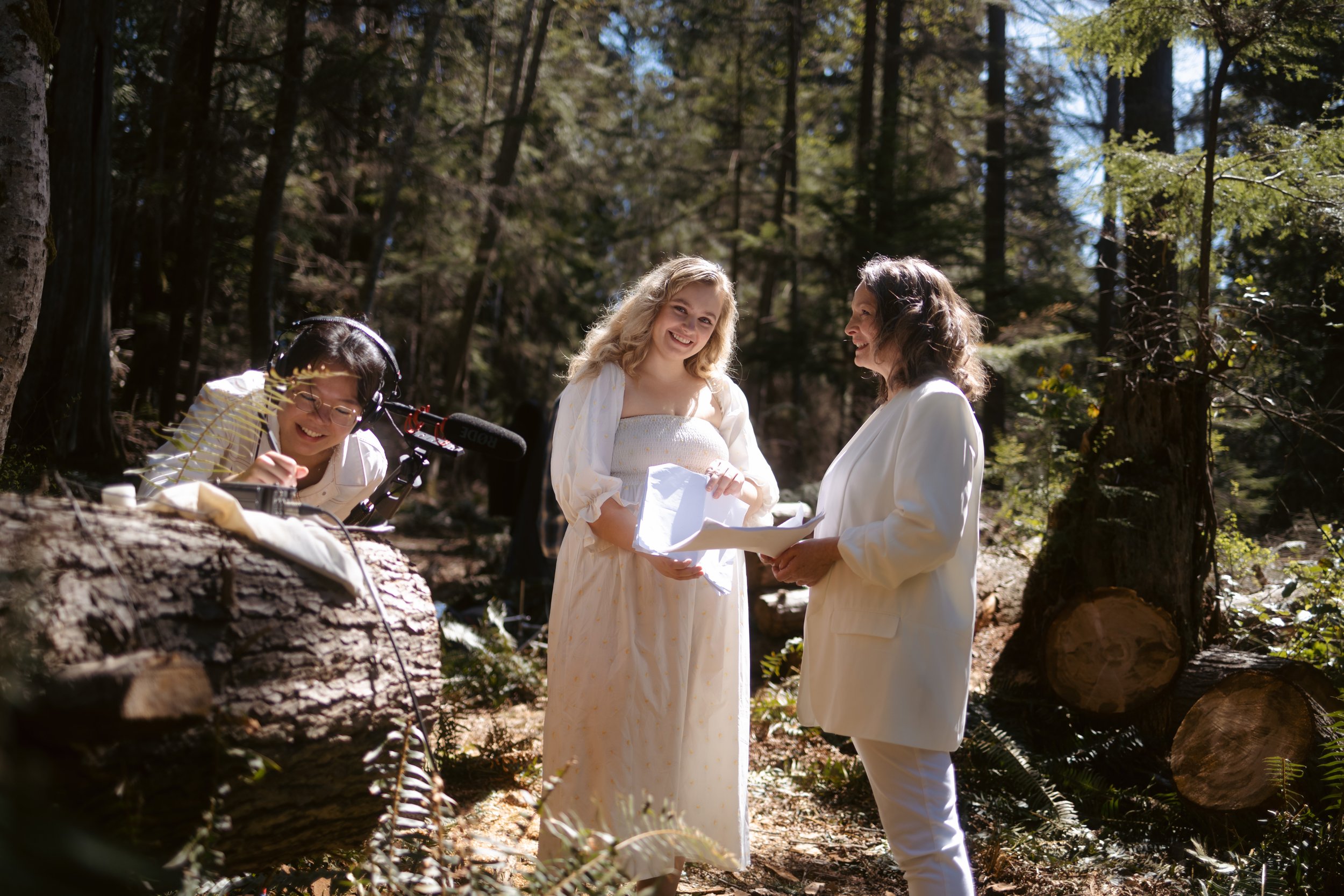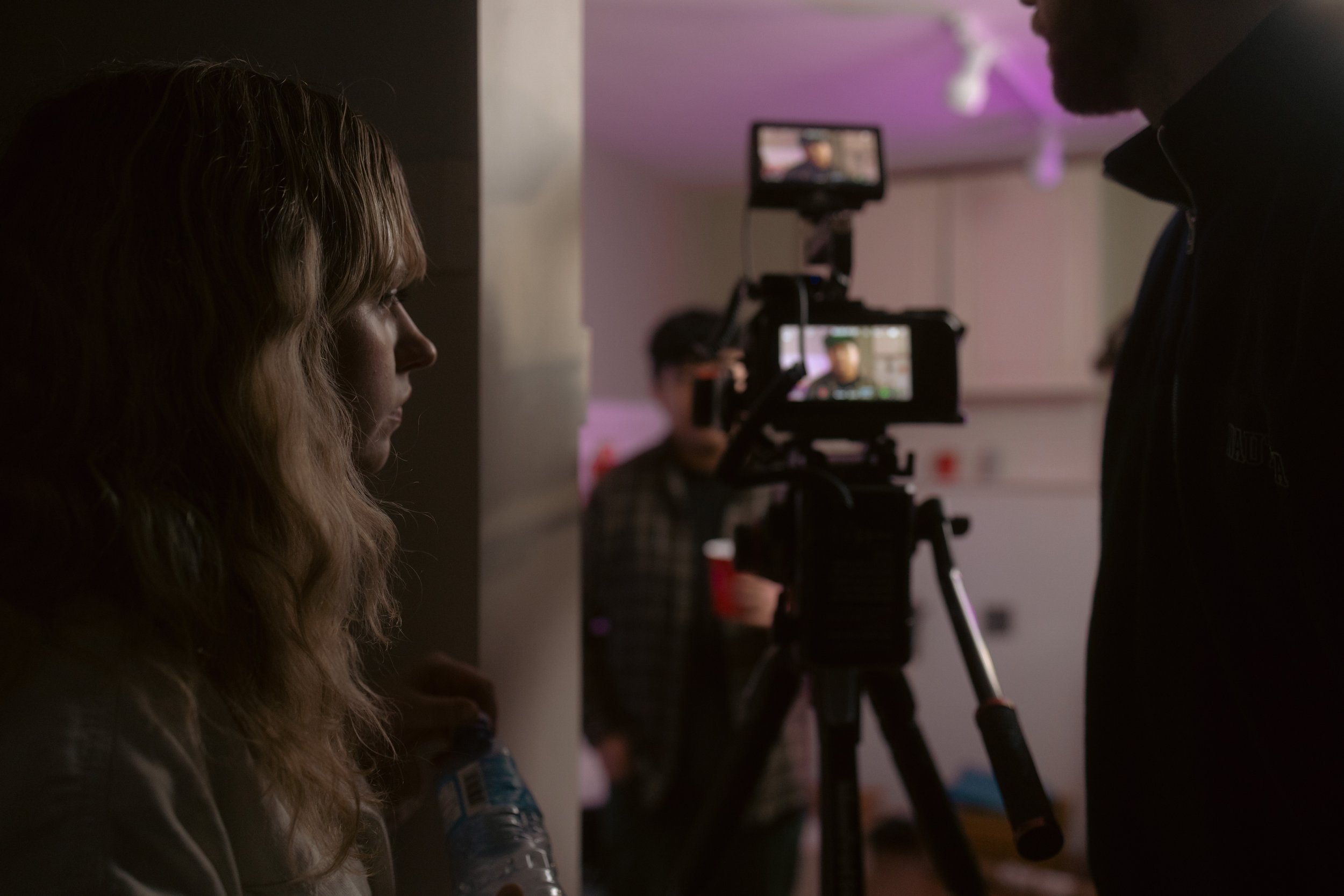Interview with actress and writer Reanna Cameron
Welcome Reanna we are very excited to have you today with us to discuss about your work.
First off, Who is Reanna Cameron and how did the passion for filmmaking start ?
First of all, thanks for taking the time to interview me! This is very special as it’s my first interview. I’m an actress, producer, and writer born and raised in Vancouver, Canada. Since I can remember I've always been a ham. I would put on plays as a kid, bossing my sister and cousins around while I was the director, lead performer, writer- everything! And I've always been obsessed with movies. My mom would be freaked out a 4 year old had memorized all the dialogue of whatever Disney film of mine was my favourite that month.
So, I've always been passionate about stories and filmmaking. I think it’s just in my DNA.
Can you tell us about your previous work ?
The Girl on the Train Tracks was my first proper venture into making my own work. And I’m super proud of it. I had been working in film, in front and behind the camera for years and years. I worked in a variety of different departments in film. I’ve worked in visual effects, casting, coordinating, sales, as an actress, you name it. But I was always making other people’s projects. I had a crisis earlier this year where I wasn’t satisfied with my long term job anymore and decided to quit and pursue my own work. I just needed to pursue my own ideas and take that risk.
CONVERSATION ABOUT: THE GIRL ON THE TRAIN TRACKS
You have a diverse background in acting, film, and psychology. How did your academic and professional experiences contribute to writing this film?
Yes, well I studied Drama and Psychology in university which some people thought was an odd combo but it always made perfect sense to me. Both subjects analyze and express human behaviour, and try to arrive at some sort of understanding or present a new productive idea. So I think interest in both those subjects are just inherently reflected in the film’s script. Actually the inspiration for writing it came from watching an awful movie I was really appalled by. I watched Blonde which starred Ana De Armas because it was receiving all this praise at award shows. So I thought, must be a good film. But then I watched it and I was horrified. It was basically glorifying and sexualizing abuse. I thought, why is this being praised? Surely someone else in Hollywood can make a better film and have a better take on this subject… I guess it has to be me. I was riled up and the script came out naturally and fast to me. And I think due to all my previous positions in film it has given me a good holistic basis and approach to filmmaking.
"The Girl on the Train Tracks" is a multi-genre film, combining elements of drama, mystery, and perhaps even supernatural elements. How did you balance these genres to create a cohesive narrative?
I’m still a newbie to writing film but the best stories always have a twist. I’m not sure how I was able to balance the drama, mystery and supernatural elements. I think I just had quite a strong thesis and through line and focused on that when writing and all the rest of those elements just fit in naturally. I was really inspired by the films Good Will Hunting and What Dreams May Come for The Girl on the Train Tracks so both those films helped shape and guide the story.
The film's protagonist, Elle, undergoes a profound transformation. How did you work with the actor to capture the character's emotional and psychological journey?
She sure does. Well, I wrote this as a vehicle for myself to star in. I was so tired of the kind of scripts I was seeing being put out there. Scripts that had no objective than just to offend and push boundaries for shock value and not actually say anything. And scripts where women were just one dimensional props. I knew I wanted to provide audiences a narrative that perhaps hadn’t been explored before. I also, selfishly, wanted to give myself a meaty role. I knew it was gonna be a very heavy role but I also knew I could deliver. And I wanted that challenge too. To show audiences what I can do as an actress. I was also the co-director, so I just worked within accessing what I needed to within myself and with my trusted co-director, Chantele Franz’s direction to deliver truth. That’s how I approach acting in general, just always tell the truth and the performance will naturally come. Even if the words and circumstances don’t match exactly your real life, you can always find some sort of common ground and deliver truth.
Can you discuss the significance of the title and how it relates to the story?
Yeah, titles are very important to me as a writer. And I always want them to be clever, but also need them to be significant. The Girl on the Train Tracks just came to me somehow. I wanted something catchy. I also wanted to create such a clear vivid picture in people’s minds, which I think The Girl on the Train Tracks does. You immediately think of the classic 1920s damsel in distress tied up on the tracks, which is very much how Elle feels during the film. And it reflects the choice Elle needs to make. To let this “train” destroy her or to try to save herself. The title basically encapsulates the struggle and journey of our main character. And how she sees herself completely defined by one thing.
What is the target audience of your work and what is the message they should convey ?
It’s cheesy and corny, but the target audience is anyone who needs this message. Anyone who feels trapped, defeated, or stagnant by trauma and not sure how to move on. Which, in essence, is probably everyone in some way.
Lastly, could you share a memorable or challenging moment from the making of the film that stands out to you as a director or as a member of the cast and crew ?
Honestly, it was a very smooth shoot as far as filmmaking goes. Of course, every film has something go wrong. We lost our sound person for the second day of shooting last minute the night before which put us in a bit of a panic and we had to quickly find a replacement. But we worked together and found someone. Honestly, what was more important to me than getting “the perfect shot”, was creating a healthy productive work environment. Film sets are notoriously very stressful and can be a place for a lot of mean and rude behavior. Number one for me was to create a respectful and kind environment on set, so I started each day’s safety meeting with laying out that standard for my set. And honestly people work faster and work better that way, so I really hope the old ways of bullying and awful treatment of people are on their way out. Great Saboteur Films is the name of my production company, and the aim is to sabotage both the content in the film industry and the environment behind the scenes for the better.
Any upcoming projects in the near future ?
Yes! Through making this project I found out not only COULD I do this, but I felt wow, I feel I'm good at this… and think I’m meant to do this as well. (“This” being filmmaking in general.) So I have another short film that I wrote that’s in pre production, that I'm also going to co-direct and star in. It’s called Never Trust A Charming Man and similar to The Girl on The Train Tracks it explores themes that are familiar but explored in a different way than we’re used to seeing. (The Girl on the Train Tracks' being themes of trauma, and Never Trust A Charming Man's being themes of gender roles, crowd behaviour, and belonging.) I’ve also written a TV dramedy pilot that's in the vein of Fleabag, that I hope to get off the ground and made it into either a web series or tv series. Hopefully next year. I’m also developing a few features as well. I’m excited for all the projects in Great Saboteur's future! But extremely proud of our start which was The Girl on the Train Tracks.
That was the interview with our beloved creator Reanna Cameron. Our community is rising everyday, new talented filmakers and screenwriters get onboard. Be sure to check the rest of our interviews and why not schedule one for yourself to promote your work.
To publish an interview simply submit on the ‘‘INTERVIEW OF YOUR FILM’’ category on our Filmfreeway page.








